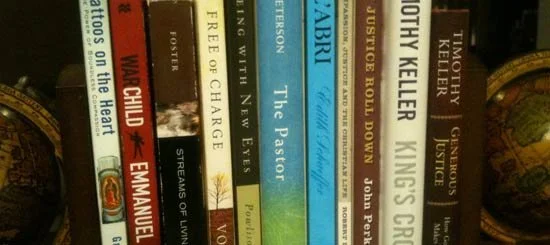Katie’s 2011 Favs
One of the myriad things I love about Katie, my wife of eight weeks, is our shared passion for books. Even better, we read a lot of the same kinds of books. And then we get to talk about them, and often, what ends up on this blog begins as a conversation over dinner or while driving through the Arizona desert. I’m smarter and wiser because I have her around, that’s for sure. On Monday I shared my top books from 2011. Here now are Katie’s top picks. There’s a bit of overlap, as you’ll notice, which owes itself just as often to me copying her as to her copying me.
Although I share my husband’s desire to read widely to develop critical and discerning thinking rather than cloning myself to one or two author’s thoughts or perspectives, I have compiled a rather narrow top 11 reads of 2011. It seems somehow wrong to have two of the same authors as well as three books on the topic of justice, but these were the books I was honestly most impacted by this year.
Gregory Boyle, Tattoos on the Heart
An inspiring and informative read about how relationship and empowerment can bring change and self-respect to those who easily believe they are worthless. Boyle is a priest whose impact shows how each of us desire to be invested in, known and loved.
Emmanuel Jal, War Child
An especially timely read in light of South Sudan’s 2011 independence, Emmanuel shares his story of becoming a child soldier. Scarred by hatred, hunger, isolation and violence while just a child, he found his voice through music which he has used to raise awareness, protest and advocate for peace, child protection and human rights.
Richard Foster, Streams of Living Water
Foster’s grace and wisdom approaches six traditions of the faith offering perspective on the strengths and weaknesses of each. Each offer enduring elements that challenge those of us who desire to live faithfully.
Miroslav Volf, Free of Charge
Who among us can say we grasp forgiveness and extending it to others? This book is best summarized by this quote from the introduction: “The true God is a God who cannot stop giving and forgiving, and that our knowledge of Him is utterly bound up with our willingness to receive from the hand of God the liberty to give and forgive.” (Dr. Rowan Williams)
David Powlison, Seeing with New Eyes
I re-read this for a class and am grateful I had the opportunity to do so. A solid collection of articles written for those who desire to help others in the process of becoming more like Christ. He encourages us to place the Redeemer at the center of the picture and find the power to change in turning to Him in all of life.
Eugene Peterson, The Pastor
Absolute soul-medicine. A masterful weaving of the formative moments of Peterson’s development into a true pastor. He redefines what we often view as the essentials of a good pastor and extends to us something richer, steeped in Scripture.
Edith Schaeffer, L’abri
The concepts of L’abri had shaped my views of hospitality and personal vocation long before I read Edith’s description of their story and vision. But this book still brought new shades of light and context to the ideas of facilitating, in relationship, the process of leaning into God and what he has to say about the realities of the world we live in.
Robert Lupton, Compassion, Justice and the Christian Life
Lupton breathes experience, wisdom and genuine love for the poor and marginalized. He navigates the tensions between reaching out with compassion and defending the dignity and humanity of every person.
John Perkins, Let Justice Roll Down
A compelling story of Perkin’s civil rights journey. Although heartbreaking to read about the depths of hate and oppression, it’s inspiring to learn from one who pursued social justice rooted in strong evangelical faith even before it became trendy.
Timothy Keller, King’s Cross
A collection of sermons based on the Gospel of Mark which bring the words of Jesus to life, offering context and references that reveal the message as truly good news.
Timothy Keller, Generous Justice
A treatise of the implications of our faith and belief in Scripture; the Biblical basis for what should drive us to pursue justice. Keller beautifully articulates what many of us know in our hearts and see as we read Scripture, but often struggle to communicate effectively.
